Triton College now offers an online certificate in Sustainable Food Production with classes beginning January 20. There are five courses-13 credits required to complete the certificate. Tuition is $108 per credit hour plus fees, which is considered in-district pricing, even though anyone in the world may apply. Spring online courses offered include: Principles of Agroecology, Urban Agriculture Issues, Sustainable Plant Production for Human Nutrition, and Managing Food Production Systems in Urban Landscapes.
#GiveOneEarth Invest in Sustainable Film & Action
One Earth Film Festival Receives Recognition from the City of Chicago
One Earth Film Festival is proud and honored to be recognized by Karen Weigert, chief sustainability officer for the City of Chicago, as a regional leader for sustainability. The festival's growth over the past four years has pushed the event beyond the borders of Oak Park and River Forest, establishing a strong presence in Chicago and throughout the greater Chicago area. This expansion demonstrates that interest and participation in solution-oriented discussion and action is growing and that change, truly is possible.
Freedom Summer Teach-in Film, presentations & discussion
By Sally Stovall
In 1964 the Mississippi Summer Project organized volunteers from across the country to travel to Mississippi, one of the nation’s most viciously racist, segregated states, to conduct a major voter registration drive. This historic effort, which became known as Freedom Summer, helped to spur passage of the Voting Rights Act just one year later. On the 50th anniversary of Freedom Summer, this Community Teach-in will chronicle the progress of civil rights in the last fifty years and discuss the most recent attacks on the right to vote, which threaten the hard-fought gains made by the heroes of Freedom Summer. Full details are on the Freedom Summer Flyer.
"One Earth...Our Earth!" Young Filmmakers Contest 2014
The One Earth Film Festival -- taking place March 7-9, 2014 – is proud to announce the 2nd annual One Earth . . . Our Earth! Young Filmmakers Contest.
This contest is open to students from upper grade school through to college level. The goal of the Young Filmmakers Contest is to invite students to use the creative medium of film to address the issues surrounding climate change and sustainability. Students are asked to make a solution based, 3-8 minute film or short 45-second animation. Films are judged by industry professionals and leaders within the environmental community.
Please share information about the Young Filmmakers Contest far and wide as we wish to grow this part of the One Earth Film Festival and build upon the wonderful success of our inaugural year! Entries are now being accepted (deadline is Jan. 12, 2014). You can download and share this year's Promotional Flyer.
Film submission deadline is Sunday, January 12, 2014. Winners will be notified prior to the 2014 One Earth Film Festival, and winning films will be screened at the One Earth Film Festival 2014 and/or at the Green Carpet opening event. Winners in each grade level category will also receive cash prizes and matching grants for a non-profit organization or community sustainability project of their choice.
Want more information? Check out the full Contest Details for the 2014 Young Filmmakers Contest.
2013 Winners
Elementary School Category
Wasteful Santa -Talia Levy, Elizabeth Larscheid, Ella Haas, Isabel Marx - Mann School
Middle School Category
Sporktagion: HEAT (Heritage Earth Action Team) - Heritage Middle School
High School Category
Let's Talk About Water - Lea Kichler - Lincoln Park High School
Questions? Please contact Katie Morris katie.a.morris@gmail.com, or Sue Crothers suebillgee@comcast.net
Neighbors Share their Experience during the Green Living & Learning Tour
Video by Cassandra West of Seeding Chicago/New Media Access to capture the spirit of the day. Thank you, Cassandra!
The weather conspired to make Saturday, September 28th, a great day for the 2013 Green Living & Learning Tour. The tour hosted nearly 400 participants in the 17 tours and demonstrations highlighting innovative examples of sustainable living in Oak Park & River Forest. The Green Living & Learning Tour was organized by a great team of Green Community Connections' talented, passionate volunteers, and was made possible through the generosity of the site hosts and guides who shared their homes and their experience with their neighbors.
The Green Living & Learning Tour offered participants opportunities to see first hand homes that are using renewable energy -- solar and geothermal, & energy efficiency strategies -- a white roof, tankless hot water heater, and multiple design features that make a home more energy efficient. Water conservation and management was also a highlight including sites that capture 100% of the rain that falls on the property for use on gardens and lawns. Use of native landscaping drew significant interest -- both for its beauty and for the benefit of providing water conservation and habitat for bees, butterflies and birds.
Partnerships were key to the success of this year's tour. The newly organized "Wild Ones!" chapter organized the tour of native plants at Cheney Mansion and the Native Landscape Mini Tour. Seventy-five people gathered for the closing to enjoy a Harvest Picnic at Field Park co-hosted by the Sugar Beet Co-op. Sugar Beet did a tremendous job of pulling together a delicious spread of fresh food -- largely from local gardens and farmers.
Special thanks also goes to the tour sponsors. New sponsors including Cindy Gajewski with Beyond Properties, First United Church of OP and CYLA Design Associates, joined repeat sponsors including Seven Generations Ahead, the Village of Oak Park, the Village of River Forest, the River Forest Park District, Green Home Experts, and WebTrax Studio.
Three Special Green Living Tour Sites to Visit on Sept. 28
Green Community Connections' upcoming Green Living & Learning Tour 2013 on September 28th offers participants the opportunity to visit an array of homes and gardens that employ a variety of sustainable living practices. Here are three unique tour stops that we wanted to highlight for you.
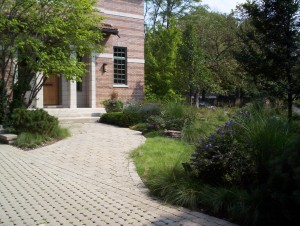 Ecological Design
Ecological Design
807 Forest Ave, River Forest, Tour at 2:30 pm (#4 on 2013 Tour Map)
Ecological principles were designed and built into this sustainably built home - the first of its kind in the Oak Park/River Forest area. The home includes renewable energy, energy efficiency, water and resource conservation, and toxic free materials. It's water conservation features include rainwater catchment for irrigation, native landscaping, permeable driveway and water-saving faucets and showerheads. The homeowners have welcomed many visitors into their home since 2008 when it was built and look forward to this year's tour.

Save $$$, Increase Comfort, Decrease Carbon Footprint
616 Wenonah, Oak Park, Tour at 4:00pm (#9 on 2013 Tour Map)
The Environmentalist’s Dilemma: Is it possible to keep your home warm in winter and cool in summer without doing a whole lot of damage to the environment? It is, and what's best, it's possible to do it on a reasonable budget. After sealing and insulating their house, the homeowners had the warmest winter in their home in 15 years and their energy bills were lower than they had ever been. Learn about air sealing and insulating and the fantastic rebates available to help make a more comfortable, environmentally friendly, (and valuable) home a reality. The Bonus: See a blower door test in action: a diagnostic tool designed to measure the air-tightness of buildings. and to help locate air leakage sites.
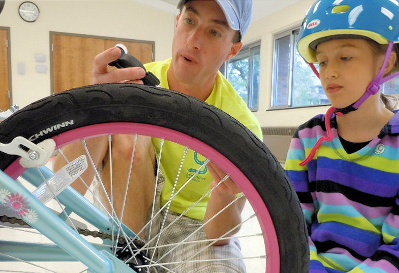 Biking Safely in an Urban Area & Biking Supports
Biking Safely in an Urban Area & Biking Supports
Greenline Wheels, 105 S. Marion, Oak Park Drop-in: 1:00-3:00pm (#C on 2013 Tour Map)
Get tips on how to stay safe while biking in an urban area. Greenline Wheels’ safety experts are teaching safety and adventure as part of the Green Living & Learning Tour. Instruction focuses on basics such as checking and fitting gears, signaling, braking, and more. Greenline Wheels representatives will also familiarize participants with other biking supports that they offer.
Harvest Picnic with Green Community Connections and Sugar-Beet Co-op
For the end of the day, all are invited for a Harvest Picnic gathering at Field Park, hosted by Sugar Beet Co-Op. All are welcome to join us at 5:00 p.m. in the northwest corner of the park (Berkshire & Woodbine) for fresh food, fun, prizes and community!
For more information about the event, including registration information for all 18 sites, visit the tour page at Green Community Connections.
Tour Native Gardens at Cheney Mansion and More with Wild Ones
as told to GCC by West Cook Chapter co-founder Ginger Vanderveer Let’s go a little wild on September 28th and visit the native side of Oak Park during the Green Living and Learning Tour 2013. This stop on the all-day tour serves as the West Cook Chapter Wild Ones September meeting; all are welcome to attend the event and/or to join the local chapter. Wild Ones promotes the use of native plants in landscaping in order to save eco-systems that nurture bees and butterflies – and vice versa.
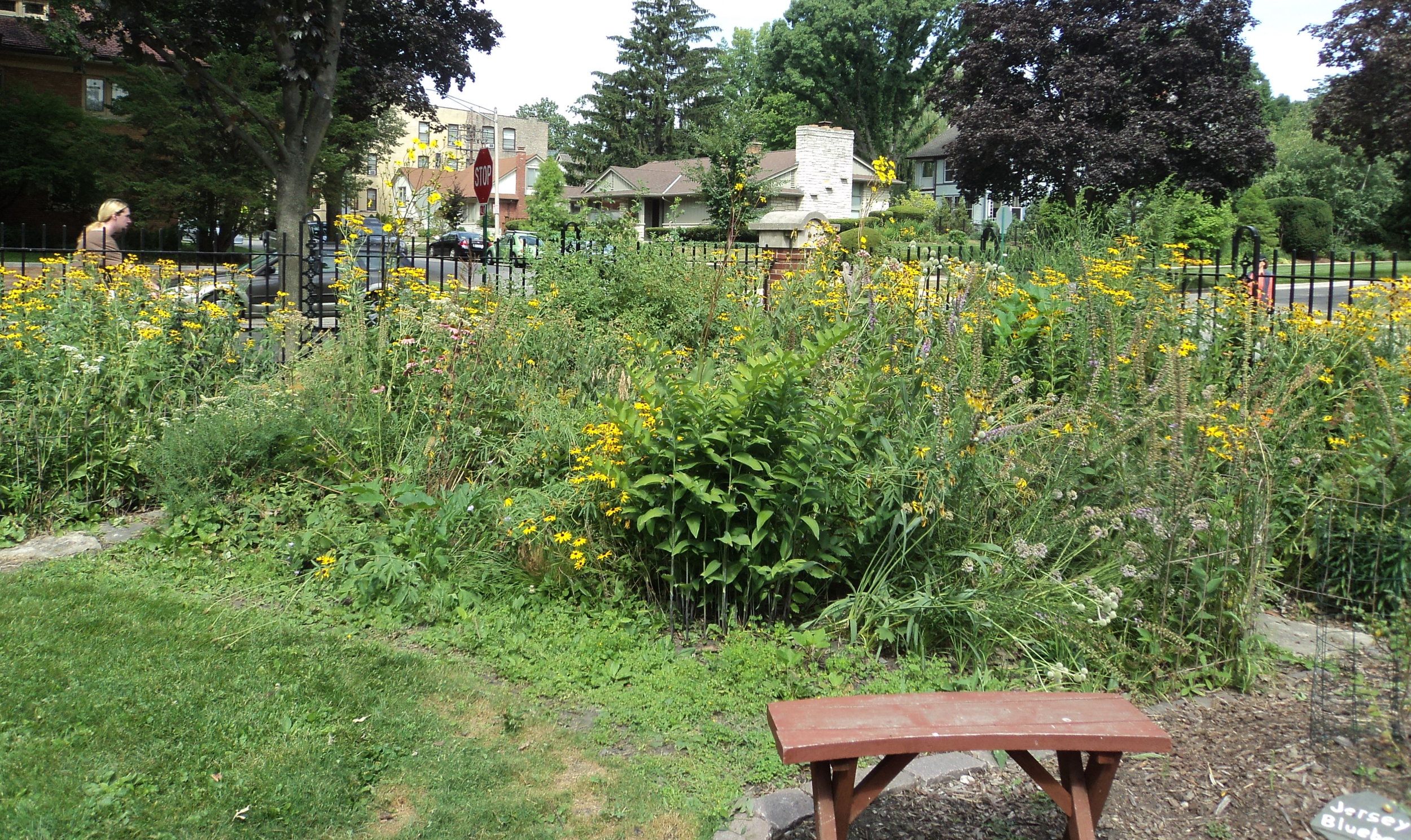 On September 28th, starting at noon, visit Cheney Mansion in Oak Park and explore the potager (kitchen garden) there. Our host, Charlie Ruedebusch, will lead a guided tour of the Cheney garden from 1 to 2 p.m, describing how the garden has evolved over the past ten years and sharing the joys and benefits (and pop a few myths) of choosing native plantings in the home landscape. Native plants attract beneficial insects to help pollinate the vegetable garden. Bring a few small paper bags and a pen – you’ll get to collect seeds of the native plants you most desire in your garden.
On September 28th, starting at noon, visit Cheney Mansion in Oak Park and explore the potager (kitchen garden) there. Our host, Charlie Ruedebusch, will lead a guided tour of the Cheney garden from 1 to 2 p.m, describing how the garden has evolved over the past ten years and sharing the joys and benefits (and pop a few myths) of choosing native plantings in the home landscape. Native plants attract beneficial insects to help pollinate the vegetable garden. Bring a few small paper bags and a pen – you’ll get to collect seeds of the native plants you most desire in your garden.
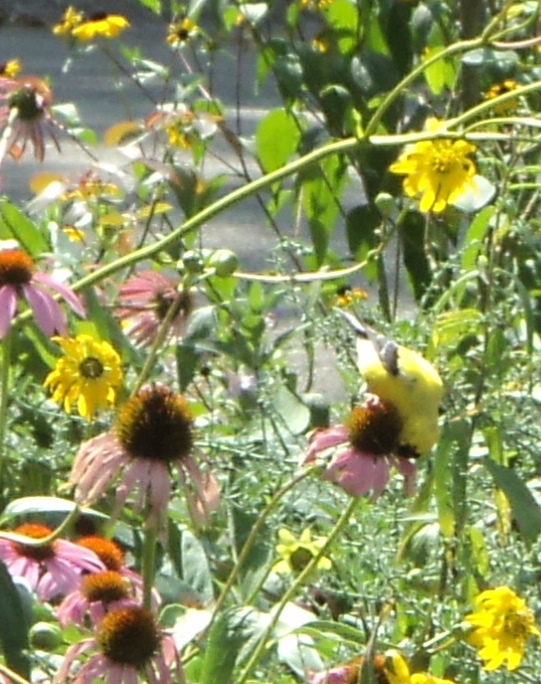 After Charlie’s tour, at 2:30 p.m. there will be an opportunity to join a group bicycle ride across Oak Park searching out food sources for bees, butterflies, and birds. We will visit gardens with native plantings that serve these creatures well. Bees and butterflies sniff out the fragrance from the nectar of native plants because it’s a fragrance they’ve smelled for thousands of years. Birds chomp greedily on the seeds of these same plants. On the bike trip we’ll admire the diversity of these hardy natives and how well they manage in our soil. Parks, schools and churches offer great opportunities to use green space to feed the creatures that work so hard pollinating the food humans eat. The bicycle tour will make stops at Scoville Park, Jackson Boulevard parkway, Good Shepherd Lutheran Church, Elmwood Street, Beye School and more.
After Charlie’s tour, at 2:30 p.m. there will be an opportunity to join a group bicycle ride across Oak Park searching out food sources for bees, butterflies, and birds. We will visit gardens with native plantings that serve these creatures well. Bees and butterflies sniff out the fragrance from the nectar of native plants because it’s a fragrance they’ve smelled for thousands of years. Birds chomp greedily on the seeds of these same plants. On the bike trip we’ll admire the diversity of these hardy natives and how well they manage in our soil. Parks, schools and churches offer great opportunities to use green space to feed the creatures that work so hard pollinating the food humans eat. The bicycle tour will make stops at Scoville Park, Jackson Boulevard parkway, Good Shepherd Lutheran Church, Elmwood Street, Beye School and more.
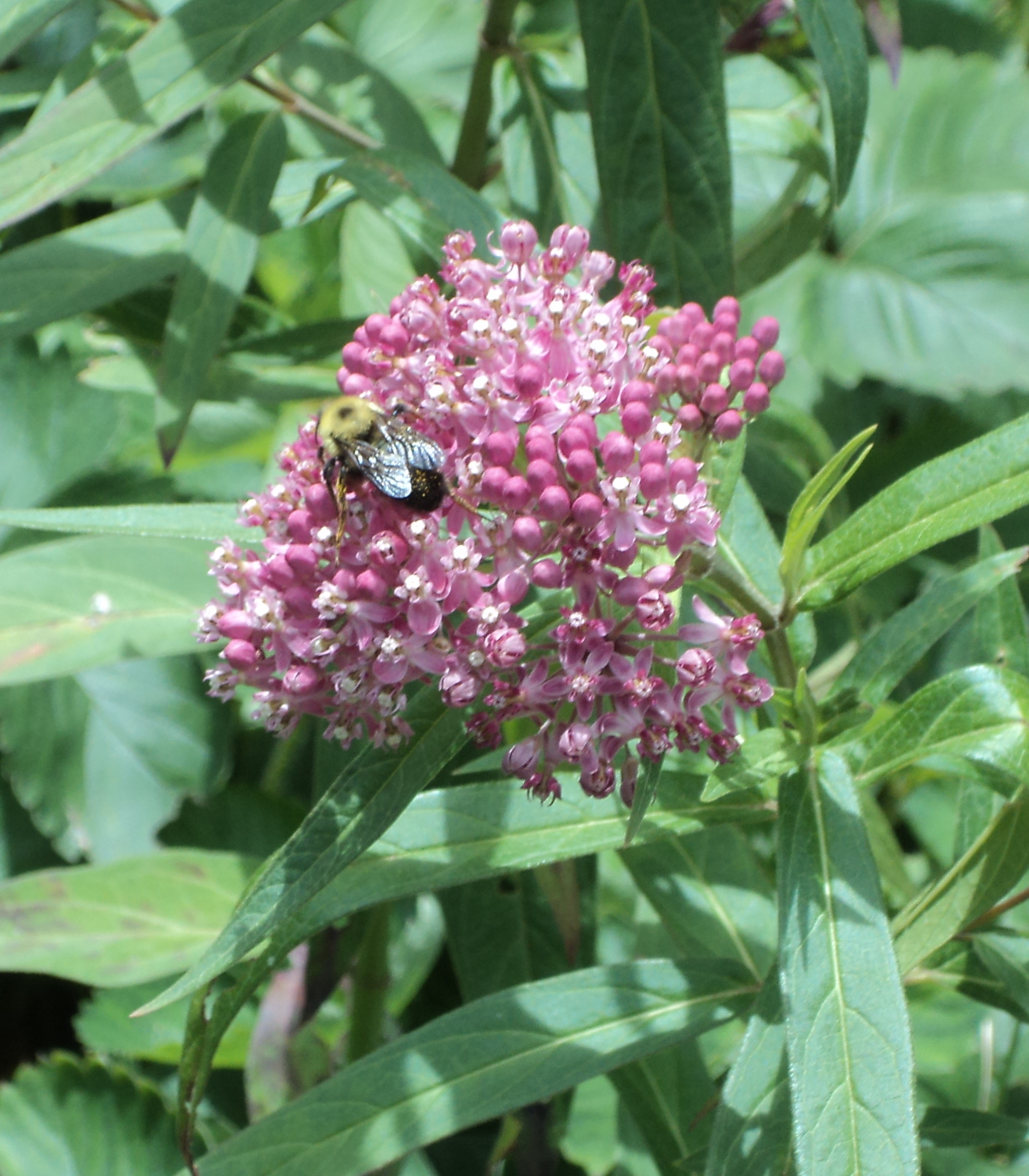
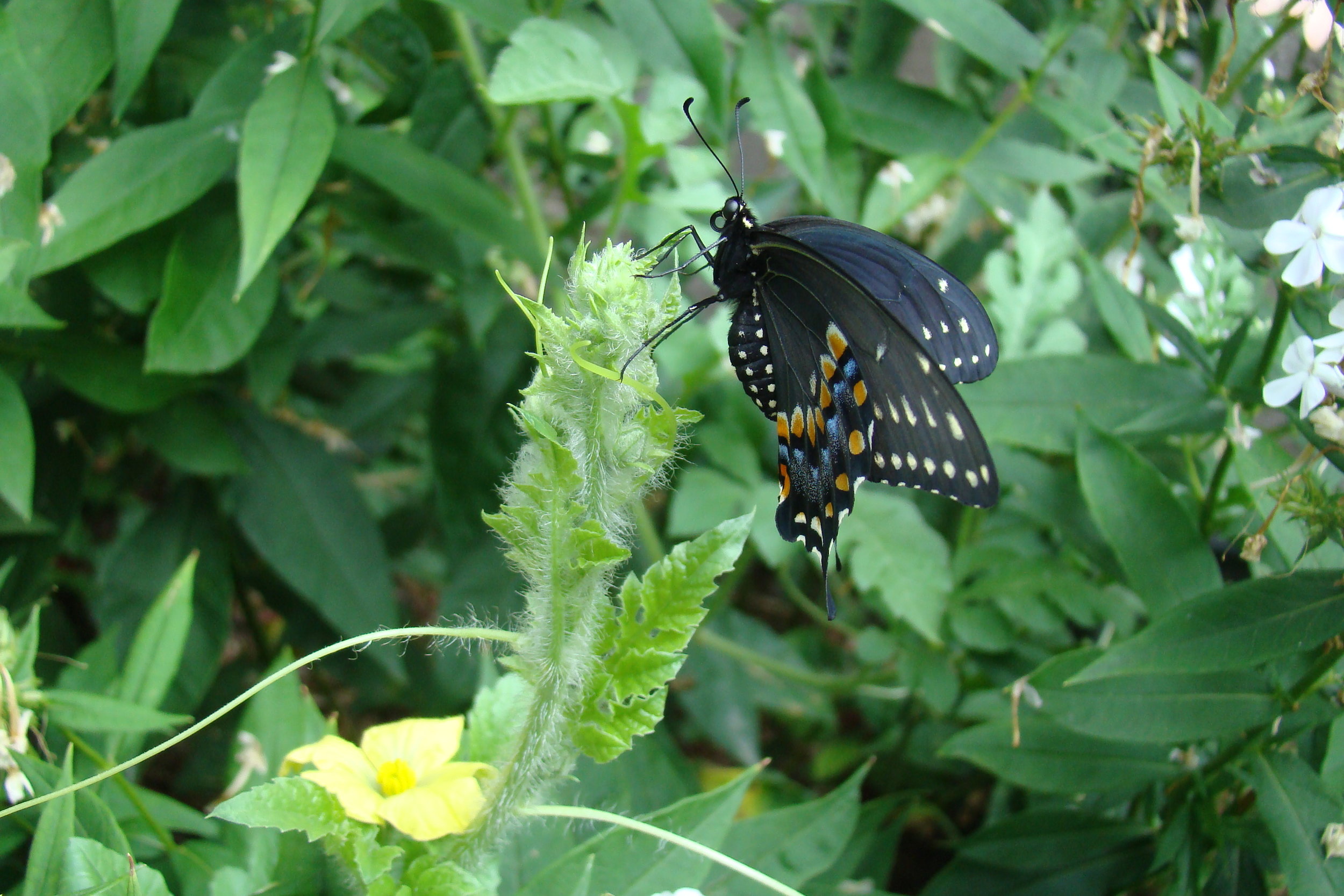 The 2013 Tour Map is available so that visitors who wish to see these gardens on their own may stop by these locations as well. From big to small, parkway to front yard, all native to mixed plantings - you’ll see a variety that will inspire you to add some natives to your garden. We also hope to have some sightings of butterflies, birds, and bees. Visiting these treasures at a leisurely pace will be our goal for the afternoon. Join us and feel the simple pleasure of going native.
The 2013 Tour Map is available so that visitors who wish to see these gardens on their own may stop by these locations as well. From big to small, parkway to front yard, all native to mixed plantings - you’ll see a variety that will inspire you to add some natives to your garden. We also hope to have some sightings of butterflies, birds, and bees. Visiting these treasures at a leisurely pace will be our goal for the afternoon. Join us and feel the simple pleasure of going native.
For more information about the event, including registration information for all 18 sites, visit the tour page at Green Community Connections.
Eco-conscious Home was Effort of Local Experts
When Craig and Megan Chesney first decided to deconstruct their old home in Oak Park and build a new, larger one, they began to research options for eco-conscious building. They talked to a lot of people and went on tours similar to the Green Living & Learning Tour to learn more. According to Megan, the building of their home was intentionally “very much a local effort from an amazing team of experts.”
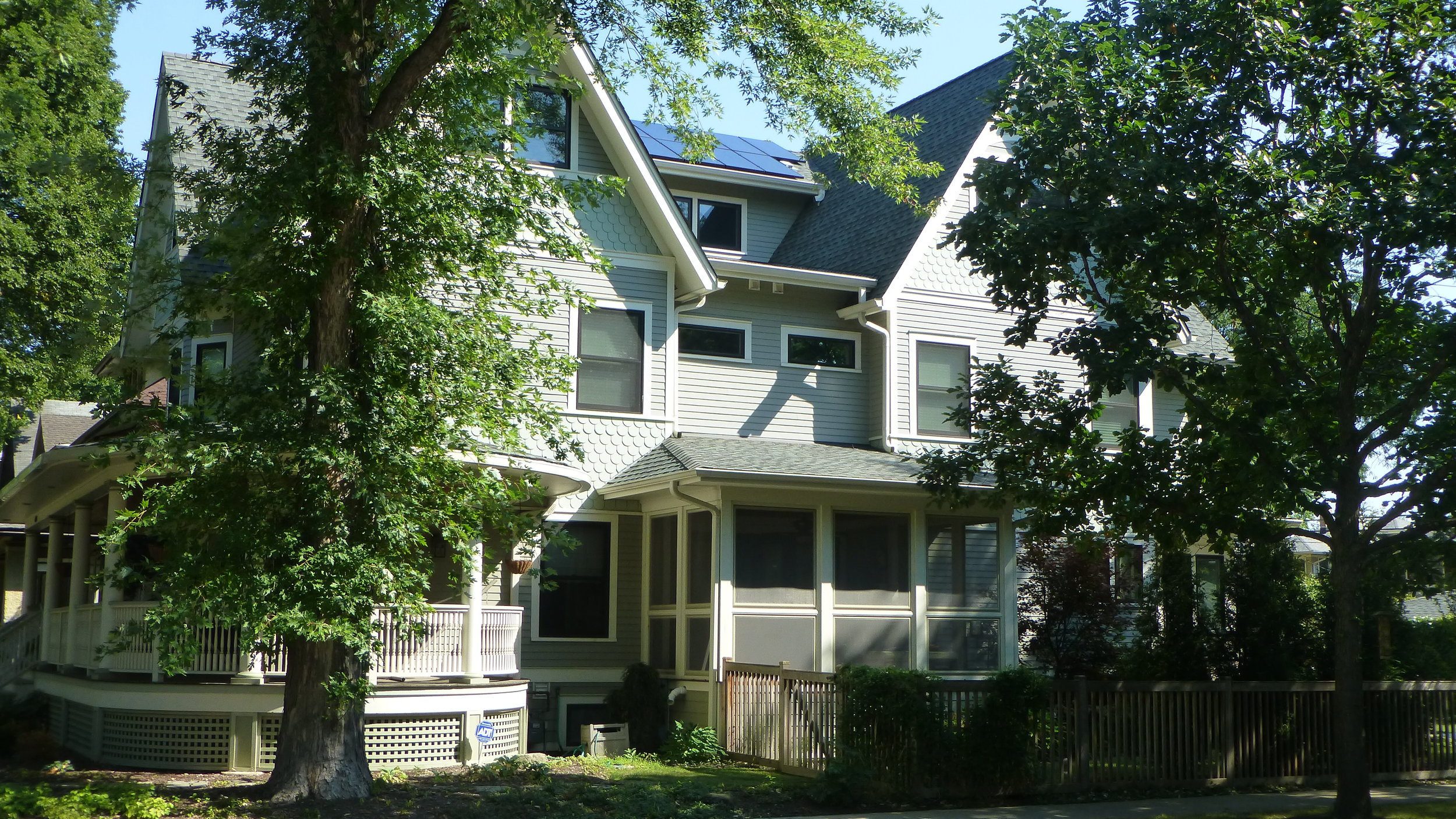
Megan says Oak Park architect, Drew Nelson of WDN Architecture, LLC, “Did a wonderful job of making a new home blend into an old neighborhood.” She continued, “Our builder, Dave Himelick (Himelick Contracting) is an Oak Parker who was open to all of our crazy ideas including a 2,000 gallon tank in our basement. Our neighbor Jim Gill helped us understand photovoltaic science and navigate the government rebate system. Yet another neighbor helped with design. Finally, many visits were made to Green Home Experts to get advice from Maria [Onesto Moran].”
According to the architect, 80% of the old home was recycled, and the new home is 60% more efficient than current codes require (see more details from the architect in this Wednesday Journal article). The indoor rainwater collection system (including the 2,000 gallon tank!) was adapted from one the Chesneys saw in a home in River Forest “whose owners [Bill Gee and Sue Crothers Gee] so graciously shared their knowledge with us,” said Megan. She says that in 2008, when they began their project, “green building” was just taking off. “Geothermal was something done more in Europe than the U.S., and when we inquired about a grey water system, we were told it couldn’t be done in Illinois.” The new home is heated and cooled by a geothermal system.
At the time, many people told the Chesneys that solar energy was not viable in Illinois or the Midwest, and they found that the Village of Oak Park was just beginning to understand how to process solar permits. The home now has solar panels to supplement electricity, and to date, according to Megan, the SunPower monitoring system reports that the home “has produced 12,286 kWh, reducing emissions equivalent to not driving 20,191 miles in a standard car or the same as planting 226 seedlings grown for 10 years.”
Megan and Craig are pleased to know that many of the features and materials they have in their home “are now common practice” and those who are conducting even “the smallest of home projects have many great [green] options.”
You can visit the Chesney’s Oak Park home during the Green Living & Learning Tour in Oak Park and River Forest on Sept. 28th. For more information about the event, including registration information for all 18 sites, visit the tour page at Green Community Connections.
Going Green in a Condo
Ever since she was a child, Lisa Kozinski, owner of an Oak Park condo you can visit on the 2013 Green Living & Learning Tour on September 28, has entertained thoughts some of us might be afraid to face, such as, “What if the water stopped running through the pipes? How would we get water then?” As she got older, that line of thinking “intensified” when she fed the thoughts with research, films, and books such as Barbara Kingsolver’s Animal, Vegetable, Miracle: A Year of Food Life. From Kingsolver’s book (summarized at bottom), Lisa was led to read others in which authors shared their similar beliefs, that “we are heading for a time when going to a fully-stocked grocery store in any season will become a thing of the past,” she said, adding, “We need to equip ourselves with the skills it will take to survive when such a time occurs.” Lisa has found this kind of thinking “oddly comforting” – primarily because it confirmed her earlier thoughts and gave them framework and purpose. She says she felt a sense of urgency to make the changes in her life that would address these ideas.
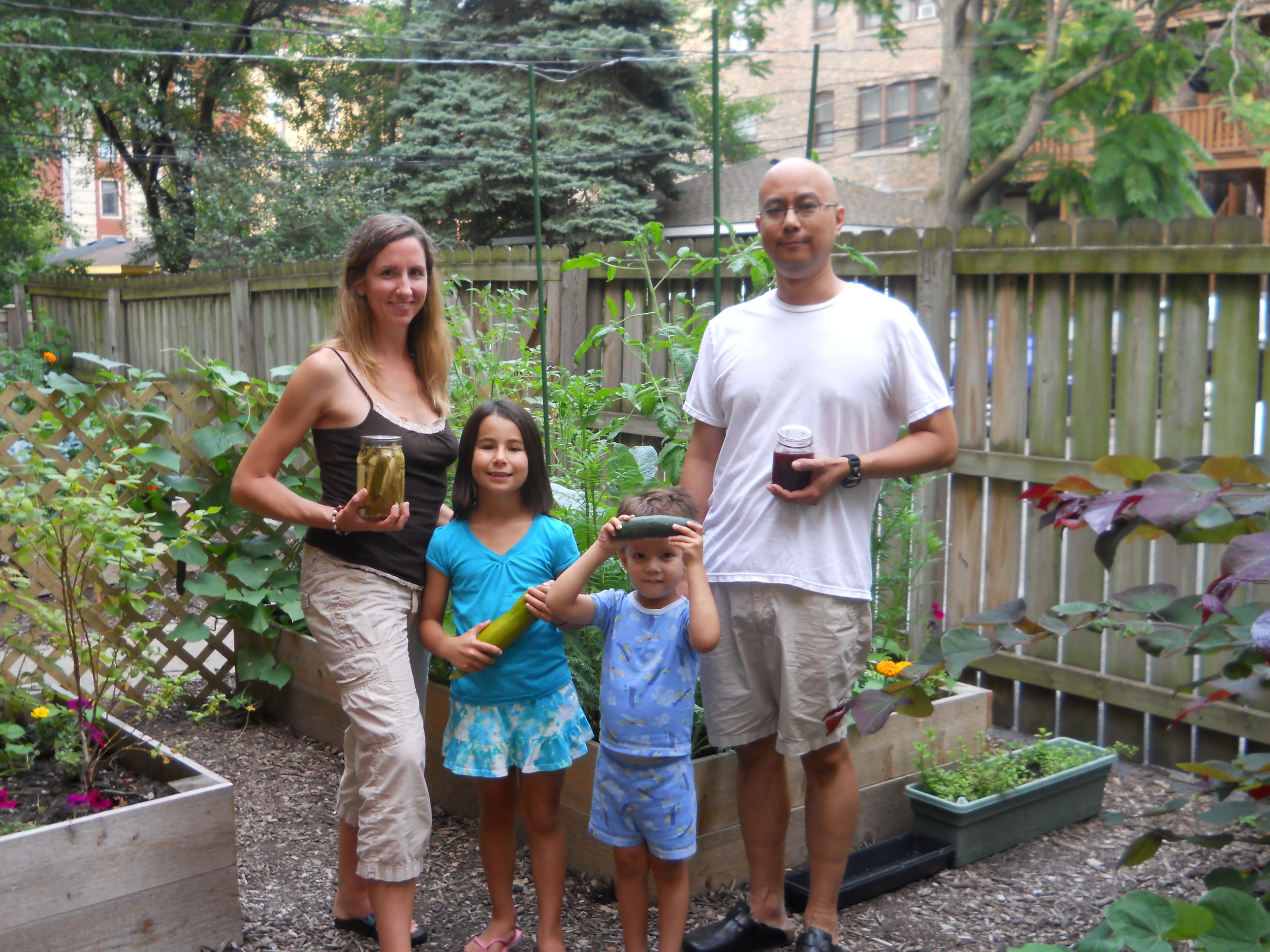 First and foremost, Lisa (pictured at left in her garden with her family) decided to use the “tiny bit of useless backyard behind [her] six-flat” to grow some of her own food. It took some planning, as it was nothing more than a muddy patch of land where, she reports, “nothing would grow and was used mostly as a dog run”. When the dog (and the neighbor) moved out, Lisa seized her chance, digging drainage ditches and spreading mulch over the top with other neighbors in the building. "We then built four raised beds and filled them with soil," she said. "At the same time, I had to figure out what I could even grow in my backyard, since my readings suggested that any garden with less than six hours of direct sunlight would not produce anything. As I observed the sunlight patterns, we were lucky if we got three-to-four hours of direct light a day. I was undaunted, however, and decided to try a variety of greens, tomatoes, cucumbers, beans and even some berries. As with any experiment, not all of the plants have thrived, but many have done so well, that I now pronounce my garden a success.”
First and foremost, Lisa (pictured at left in her garden with her family) decided to use the “tiny bit of useless backyard behind [her] six-flat” to grow some of her own food. It took some planning, as it was nothing more than a muddy patch of land where, she reports, “nothing would grow and was used mostly as a dog run”. When the dog (and the neighbor) moved out, Lisa seized her chance, digging drainage ditches and spreading mulch over the top with other neighbors in the building. "We then built four raised beds and filled them with soil," she said. "At the same time, I had to figure out what I could even grow in my backyard, since my readings suggested that any garden with less than six hours of direct sunlight would not produce anything. As I observed the sunlight patterns, we were lucky if we got three-to-four hours of direct light a day. I was undaunted, however, and decided to try a variety of greens, tomatoes, cucumbers, beans and even some berries. As with any experiment, not all of the plants have thrived, but many have done so well, that I now pronounce my garden a success.”
At last year’s Green Living and Learning Tour, Lisa took a pledge to start canning. While she knew “nothing” about how to do it, she says she “could hardly wait for the spring and summer to arrive.” She is pleased to be canning her own jams, tomatoes and pickles, knowing that she would be able to use them all year long without fear of BPA and knowing that what she preserves comes from local farmers in season. “I still have a lot to learn, and each year I will take something new away, trying new recipes and methods and tweaking them to my taste buds. It has been an adventure that I look forward to continuing each and every summer!”
Visit Lisa, her family and the garden in back of their condo during the Green Living & Learning Tour in Oak Park and River Forest on Sept. 28th. After checking out the raised bed gardens, composting and rain barrel in the tiny back yard, visitors can head upstairs where Lisa will be discussing various methods of home food preservation, including canning and fermentation. Under the umbrella of canning, we will talk about making fruit jams and pickling vegetables. As for the far more ancient method of lacto-fermentation, we will discuss how to make milk kefir, yogurt, and fermented vegetables, such as pickles and sauerkraut. There are many nutritional as well as environmental benefits to both of these methods of home food preservation.
For more information about the event, including registration information for all 18 sites, visit the tour page at Green Community Connections.

Since its release in May 2007, Animal Vegetable, Miracle has helped launch a modern transition in America’s attitudes toward food. In this lively account of a family’s locavore year on their farm in Southern Appalachia, Barbara Kingsolver and her coauthors unearth the secret lives of vegetables and the unexpected satisfactions of knowing their food producers — and sometimes their dinner — on a first-name basis. Animal, Vegetable, Miracle: A Year of Food Life makes a passionate case for putting the kitchen back at the center of family life and diversified farms at the center of the American diet. - from the book’s website









